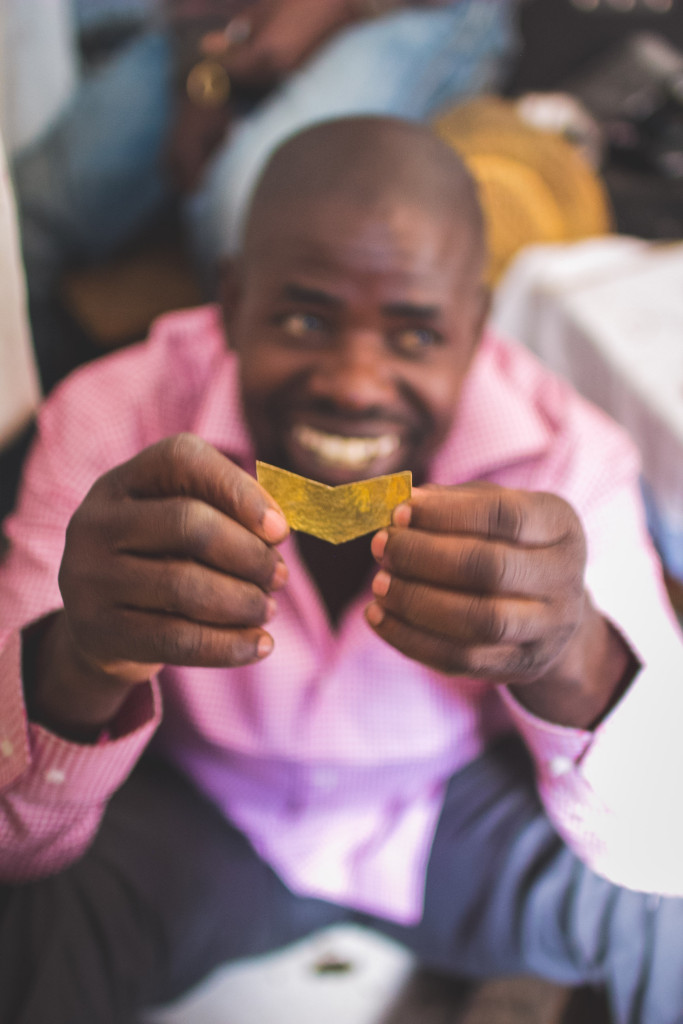He Is Called Ojiko
April 21, 2014
When asked whether he is afraid of anything, Ojiko says with a smile, “I am only afraid of hunger.”

Not one to speak so openly about himself, Ojiko’s eyes are merry and serious all at the same time, as if inviting anyone to dare challenge his bold statement. Though he welcomed us into his small home in Kibera with a warm smile, Ojiko was shy to tell us his personal story.

Ojiko lives in one of the eleven villages of Kibera, called Soweto. Despite being one of the poorest parts of Kibera, there is still a sense of happiness and hope – young children play alongside the paths as we walk down into the valley where his house is located.
Ojiko easily talks about his professional life as a jeweler. Inside his house, he is eager to discuss his work as he digs out chains, earrings and rings from a container under his bed. The beauty of the jewelry is astonishing, emphasized even more so by the setting in which it is made. Once again, Ojiko smiles as he invites us to try on the jewelry and admire ourselves.

“When my father died, I was only in class four (5th grade in the US) and there was no more money for me to continue with school. There was nothing much for me to do when other children went to school. Sometimes I would sell charcoal at the market but I mostly sat and waited with nothing to do.”
Through all this, Ojiko also had to figure out how to help his widowed mother through financial difficulties. As the first-born son, family responsibilities now rested on his shoulders. He could not have been more than twelve years of age at the time.

A friend offered him a job herding cows, so he went to Suba, a remote and rural district on the border of Kenya and Uganda. There he worked as a cattle herder, earning 1,000 shillings per month ($11.50 USD) and sending 700 shillings ($8 USD) home to support his mother.
Ojiko spent a year as a cattle herder when his employer and mentor, a secondary school teacher named Dominic Kiboye Sure, told him he could do more with his life if he attained a marketable skill.

Dominic sent him to Waudo Polytechnic, also in Western Kenya, where Ojiko enrolled to learn welding for a year. He employs this skill to this day as part of his jewelry craft. He would work herding cows during the holidays and attend school for the rest of the year.
Ojiko’s next step in developing his jewelry technique was an apprenticeship at Victorious Bones Kibera, learning how to create remarkable pieces from upcycled bone. For six years, Ojiko worked throughout Nairobi and in Mombasa, where he developed skills working with silver, wood, leather, horn, and silver.

In 2011, Ojiko decided it was time to branch out on his own. “I got tired of feeling like a school going child. Now I can work when I want and if I get tired, I can lie down and rest without anyone bothering me.” Who wouldn’t like the sound of that?!
A micro-finance loan gave him start-up capital to purchase a drilling machine and gas cylinder, essentials for opening his jewelry business. Now just one of his products sells for 4700 shillings ($55 USD), a long way from the 1000 shillings/month he had been earning as a cattle herder in Suba district.

Ojiko’s multi-disciplinary talents result in innovative designs that are a striking mix of traditional technique and modern style. The shy playfulness and cheerful spirit that comes out as he tells his story can also be seen in his designs, like the Tepe Mixed Media Pendant. After letting us into his world, it’s clear that Ojiko’s home is not only his workshop, but his hope.

—————-
PERSONAL PERSPECTIVE
Visiting the artisans in their homes has been such a privilege.
Seeing their handiwork in context has also added to the beauty of the pieces for me.

And being at SOKO, I’m learning valuable lessons about empowerment. As a business, SOKO is creating demand and a market for these artisans. Artisans like Ojiko don’t want a handout; they want their skills and products to be acknowledged, appreciated, and rightfully compensated for.
But not everyone I’ve interacted with is like Ojiko.
I have been asked by a few locals for tangible things whether it be my jewelry (little do they know that my pieces are low-quality Forever 21 finds and that their hand-crafted pieces here are 10x the quality!), a simply cell phone, or tuition for education. But it’s a struggle because as much as I would love to give them these items or fulfill these requests, these one-time gifts don’t create long term impact. If anything, it may affect people negatively, building an unnecessary dependence.
Additionally, although Kibera is the biggest slum in East Africa, Nairobi isn’t totally impoverished.
There are many classes of people including a prevalent middle class. Is it best for me, a foreigner who is only here temporarily, to provide these gifts?
There is a tension there.
How can I partner with this city as a whole so this local community can be the ones caring for their neighbors? How can I connect those who are requesting this help for me to local movements?
Poverty is a multi-faceted issue and it’s going to take more than one initiative to tackle it.
I also have to remember poverty isn’t simply the lack of material things.
There is relational poverty, emotional poverty, spiritual poverty.
And I am not the Savior.
I am a storyteller.
A storyteller who has hope in the Savior who is up to something really marvelous here.
